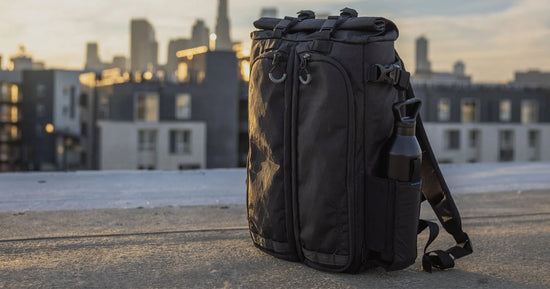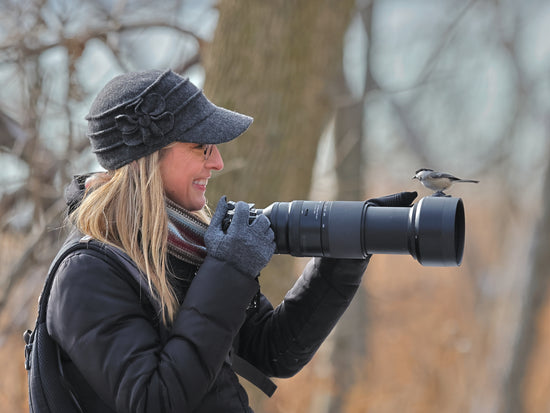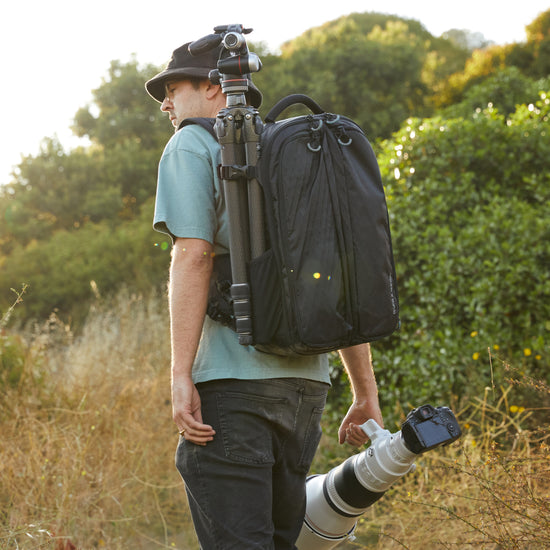Marsel has been a Gura Gear Pro Team photographer for many years. His most recent book Mother - A Tribute to Mother Earth was published last year.
How did you get started in photography?
I was born in Rotterdam, The Netherlands. At first, I wanted to become a journalist, so I studied Dutch language and literature at university. That's where I realized that I spent way more time on my papers' graphic design than on the contents. I come from a creative family, so I guess it was inevitable that I switched to art school.

After four years, I graduated in graphic design and art direction — photography didn't appeal to me at all back then. Immediately I got a job as an art director at one of the major ad agencies, and I did that for 15 years.
Part of my job was to select photographers to shoot the ad campaigns my copywriter and I developed. By working closely with many different photographers, I learned to understand and appreciate photography, and I eventually picked up a camera myself. That's how the hobby started.
On our honeymoon to Tanzania, I got bitten by the safari bug and knew that this was what I wanted to do more. Curious whether I was any good, I decided to enter some of my work into various major international photography competitions. Every now and then, I'd win something, which made me realize that I could maybe someday become a full-time professional photographer.
During the last three years of my advertising career, I had my own ad agency, and with it came a bunch of stress. By that time, photography was a hobby totally out of control, and I started using it as an escape from life in the fast lane. And then, one day, I decided I had enough and wanted to start a new career.
During the 16 years that followed, I traveled around the world, capturing the world's wild places and animals.

What was the first camera you ever owned? And what are you shooting with these days? Any reason? If you had to pick one lens could you? Which would it be?
The first camera I ever owned was a little pink and lilac colored Haking point and shoot. My then girlfriend bought it for me because she thought it was cute.
I am now in the process of going completely mirrorless. Mirrorless is the future, so there is no point delaying the inevitable. I have a Nikon Z9 and a Z7, and I will likely add another Z9 to that as I prefer to travel with three bodies. I still use my Nikon DSLR’s (a D850 and D5), but not much. The new mirrorless cameras are a big improvement over the old technology.
If I had to pick one lens, it would be a 24-70/2.8. I love zoom lenses for the creative flexibility that they offer. 24 mm is still wide enough for landscapes and 70 mm is a good start for animalscapes.
Please see Marsel's review of the Chobe 2.0 Everyday Carry
Where are you currently based? Do you think you'll continue to stay there or do you think you'll move soon?
As several of the photo tours that we run are in southern Africa, we decided a couple of years ago to move to South Africa. We have been living here for four years now and really love it. We won’t be moving anytime soon.

What are some of your favorite places to photograph and why?
I like really wild places with strong lines and graphic shapes. Nothing beats being outside in nature. It is life in its purest form. Nature is always exactly what it is supposed to be. It runs at the perfect speed. There is no fashion, no politics, no corruption, no distractions from the things that truly matter.
Apart from being a nature lover, I graduated in graphic design and that is still how I look at the world. I like order and simplicity, and that is reflected in my photographic style. Dead trees are more graphic than live ones, so as a photographic subject I prefer them dead.
Who are some photographers that have inspired you and/or continue to?
When I first started in photography, my biggest inspiration was Art Wolfe because he did both landscape and wildlife photography and he did them both well. Those two genres are very different and require a completely different mindset, workflow, and skillset. Most great landscape photographers are mediocre wildlife photographers, and most great wildlife photographers struggle with landscapes. Art Wolfe proved that it was possible to do both genres well, and that was exactly what I wanted to achieve myself. My favorite shots are the ones where I combine landscape and wildlife photography in one image — the so-called animalscapes.

What or where inspires you next?
I get more inspiration from creative genres outside of photography than from within my own bubble. I love architectural renderings, conceptual art, (classical) sculpture, dark art, the work of Caspar David Friedrich, Rembrandt, and Caravaggio, philosophy, and death metal. But the biggest inspiration will always be nature itself.
What do you look for when creating a photograph? Do you go in any order like "light, subject, composition, action" or is it a different process?
There are two very distinct stages for most of my photography. The first stage is the conceptual stage during which I decide what I want to photograph, try to pre-visualize the images that I want to create, and make a detailed plan. This is my conceptual workflow: What? > Why? > Where? > When? > How? In that order. Once I am on location I usually already have a very good idea of what I’m going to do and how I’m going to do it. I like to work very analytical, plan-based. The location and the conditions are more important than the subject or the action.
How would you define your style of photography?
My images are my personal, artistic interpretation of the natural world, and I like them to be clean, simple, graphic, and unambiguous.
How does photography play into your daily life? Do you have any specific practices on taking breaks or compartmentalizing?
When I’m home, I don’t touch my cameras. On average, Daniella and I are traveling nine months a year. As much as I love photography, I don’t think it’s healthy to run around with a camera all year long. Every now and then you need to take a few steps back and detach yourself from what you’ve been doing. When you photograph a lot, it’s very easy to get into autopilot mode which is the death of creativity. In my spare time I like to mountain bike, listen to death metal, watch Formula 1 and television series, and listen to philosophical debates.

What are some of the most interesting changes in photography that you've observed over your career?
“Interesting” can be positive or negative. The biggest change I have observed is the one from film to digital. I used to shoot film but always thought the entire process was extremely old-fashioned compared to other technology that was already out there. I jumped ship as soon as I could. More people started to photograph, and they learned faster because they could actually see what they were doing. The second change is the introduction of mobile phones with cameras. Suddenly everyone was walking around with a camera. The third change is when social media started. This further increased the amount of people photographing, but also traveling. Social media led to selfies and turned photography into a popularity contest obsessed with likes, followers, and comments. While I love certain aspects of social media, I absolutely detest what it has done to society and to communication. The fourth change is the shift to mirrorless cameras, a very positive change. I was happy to get rid of my big, noisy, and heavy DLRs.
How far do you go to capture a truly unique moment? And what is the craziest thing you've done to capture a photograph?
The problem with wildlife photography is that you can’t predict what will happen. Unique moments simply happen and you just have to be there to capture it. This is one of the biggest differences with landscape photography, which is much easier to plan.
I try not to do any crazy stuff when I’m photographing wildlife. Crazy can end up badly for the wildlife or for me.
Where can we find more of your work?
On my website (www.squiver.com) or on my Instagram page (@marselvanoosten).
Can you tell us about the project(s) you're currently working on?
One of the negative aspects of internet in general and social media in particular, is that it has turbo-boosted copycat behavior. Someone posts a great image of some new location, and immediately thousands of people around the world decide that they want to go there too. A completely wild and remote location that is rarely visited by humans can turn into a selfie hellhole within a single year. There are countless examples of this, and I have experienced it myself several times. As a result, I stopped sharing specific location data many years ago, as well as new projects.
What I can say though, is that for the next 1.5 years I will be traveling almost non-stop — our photo tours schedule was already full, but we also had to fit in all the tours that were canceled because of Covid. In 2024 I have planned a couple of private projects that I’m really looking forward to.






